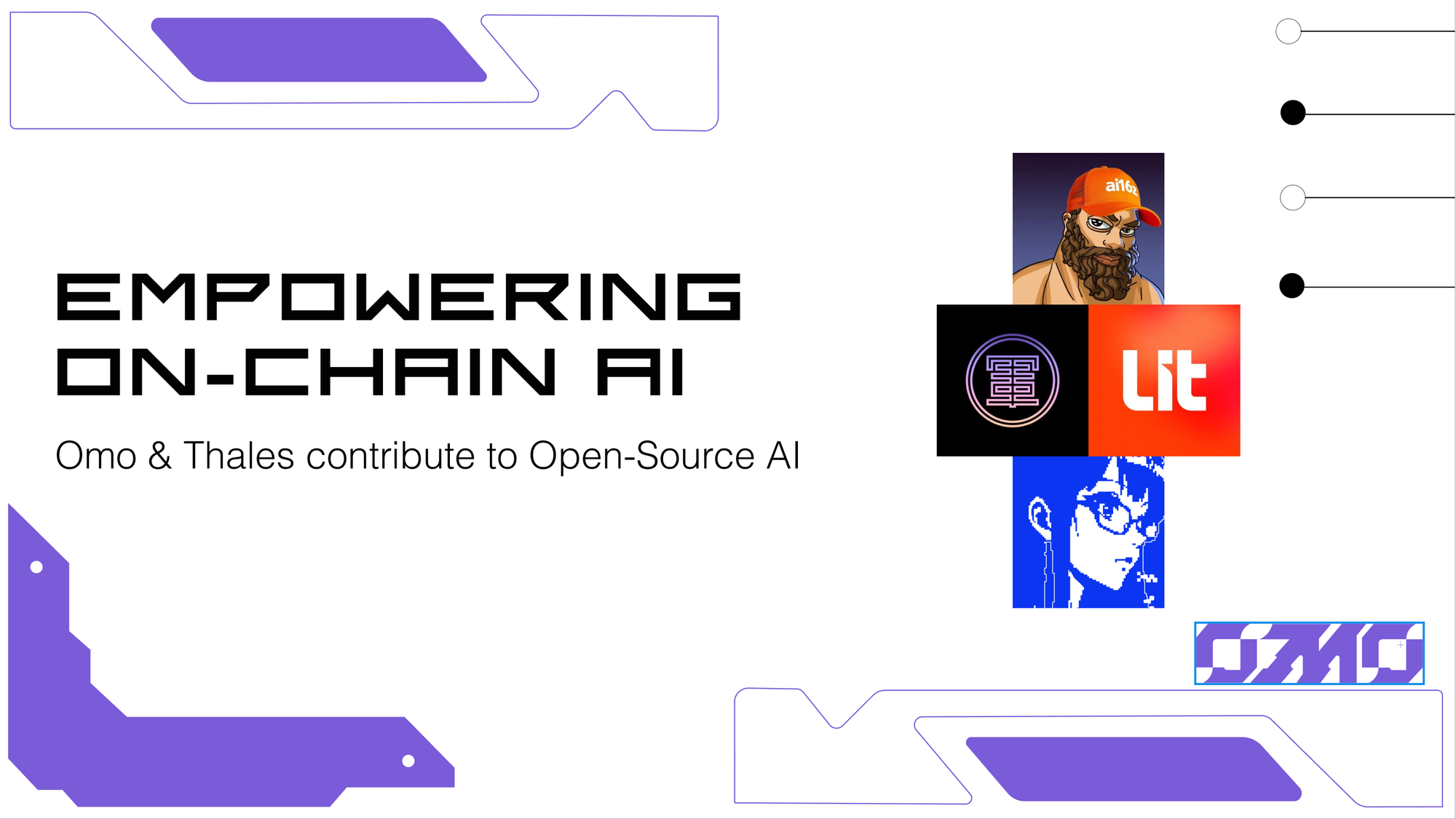Omo Participates in Open-Source AI

Introduction
The realm of AI agents operating directly on-chain has expanded significantly, setting the stage for rapid innovations in secure key management, cross-chain transactions, and permissionless autonomous interactions.
At Omo, we believe that advancing this intersection of AI and blockchain requires openly sharing powerful building blocks with the broader developer community. Today, we are excited to announce the open-sourcing of two plugins that we view as critical for secure, cross-VM AI operations. The first is the Lit Protocol Plugin, which provides private key pair generation and signing in a robust TEE+MPC environment, while the second is the Shogun Plugin, an intent-solver infrastructure designed to facilitate low-slippage, cross-VM asset transfers.
Both plugins were developed in collaboration with Thales, an AI Agent project pioneered by Redacted Research, and have proven their effectiveness in enabling on-chain agents that offer the flexibility and security necessary for advanced DeFi strategies.
Lit Protocol Plugin
Relying solely on single-enclave Trusted Execution Environments (TEEs) for secure key management presents vulnerabilities if the TEE is compromised or lacks proper isolation. It also complicates the process of implementing granular guardrails for developers who need to limit the scope of an agent’s interactions with various protocols and assets.
With Lit Protocol’s integration of TEEs and Multi-Party Computation (MPC), signing authority is distributed across multiple nodes in a secure network, significantly reducing the risk posed by potential single-point attacks on TEEs. This dual-layer security model also simplifies the process of enforcing real-time policy checks, ensuring that AI agents adhere to predetermined constraints and cannot deviate from allowable behaviors.
Shogun Plugin
On-chain AI agents also face challenges in efficiently moving assets across different blockchains or virtual machines, especially when they rely on basic messaging protocols that fail to optimize for user-centric outcomes such as low slippage or best execution. Without an aggregated source of liquidity and sophisticated routing, asset transfers can become expensive and slow, and they often result in unfavorable trade conditions.
Shogun addresses these problems by acting as an intent-solver. Rather than issuing standard cross-chain messages, it looks for optimal execution routes across a broad range of centralized exchanges, decentralized exchanges, and bridging solutions. This enables agents to minimize slippage, streamline multi-chain navigation, and unlock opportunities for complex DeFi strategies such as arbitrage and yield farming.
Why Thales?
In collaboration with Thales, a forward-thinking AI agent recognized for its real-time data-driven insights and traction on platforms like DeFAI and Kaito, we have already seen how these plugins enhance the capabilities of on-chain agents.
Thales used Omo’s open-source technology to execute fully autonomous transactions, supplying assets, borrowing funds, and orchestrating multi-step DeFi strategies with minimal developer oversight. By restricting Thales to a whitelist of specific DeFi protocols and assets, Omo effectively demonstrated how the Lit Protocol Plugin can impose agentic guardrails, while the Shogun Plugin seamlessly identified optimal swap rates on Base, enabling smooth orchestration of highly complex financial operations.
Thales further showcased how “blind computation” frameworks, such as those introduced by Nillion, align with our view that verifiability and robust security are fundamental to ensuring the reliability of permissionless AI.
Agent Demo Days
Nader Dabit and other industry figures, including Shaw from ElizaOS and Jasper from Hyperbolic Labs, joined a live demonstration of Thales in action. During the event, Thales successfully handled various assets such as USDC and cbBTC while interacting with Omo’s agentic vault architecture, where depositors can spin up “yield agents” and automate strategies involving loans on Morpho and liquidity provision on Uniswap V3.
The demo was met with significant engagement, drawing more than 34,000 live viewers, which was 3.5 times greater than a previous demonstration. The recorded streams and highlights also garnered over 200,000 views, reflecting the growing interest in agentic DeFi solutions. For anyone interested in the complete demo, the livestream replay captures the Thales agent in action starting around the 3:28 mark, illustrating how the Omo vault architecture and newly open-sourced plugins work together to advance AI-driven on-chain orchestration.
Conclusion
The open-sourcing of Omo’s Lit Protocol and Shogun plugins marks a pivotal step toward secure, efficient AI agent operations on-chain, bridging critical gaps in decentralized key management and cross-chain execution. By combining TEE-MPC hybrid security with intent-driven liquidity routing, these tools empower developers to build autonomous agents capable of executing sophisticated DeFi strategies while adhering to strict safety and policy constraints. The successful collaboration with Thales and the overwhelming response to its live demonstration underscore the transformative potential of merging AI with blockchain, setting a foundation for a future where permissionless, agentic ecosystems drive innovation in decentralized finance.
Stay Connected
- Follow us on Twitter @OmoProtocol
- Learn more about Lit Protocol
- Learn more about Shogun.fi
- Learn more about Thales
- Subscribe to our newsletter for exclusive updates

